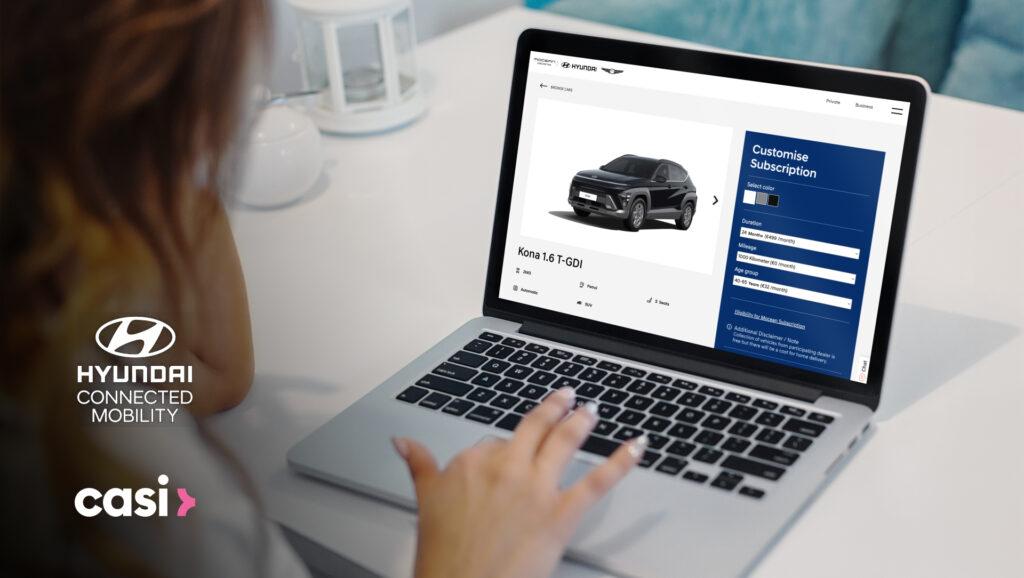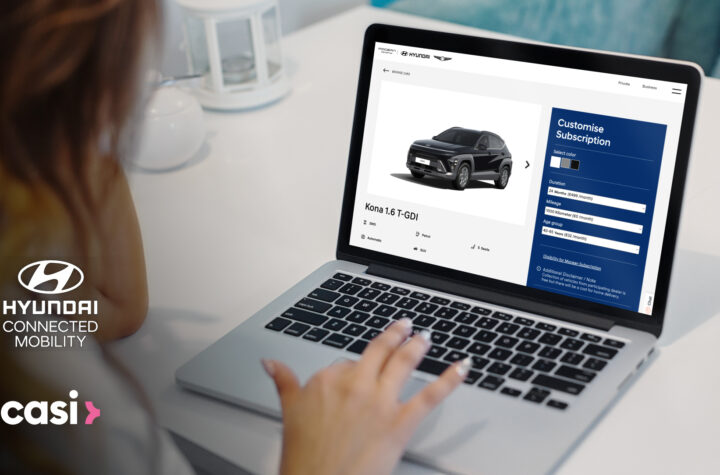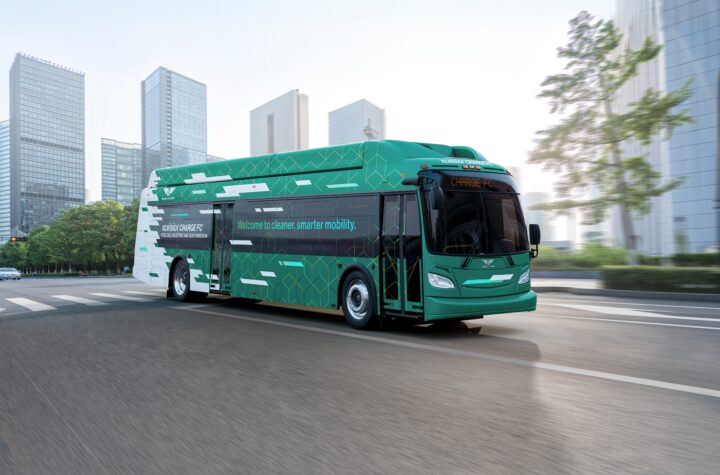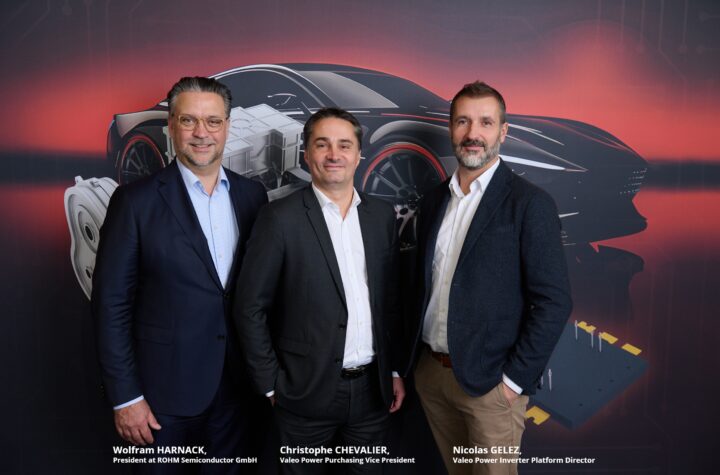
Automotive Industries interview with Hans Kristian Aas, CEO and Co-founder of Casi
In today’s rapidly evolving automotive landscape, flexibility, efficiency, and sustainability have become the hallmarks of modern fleet management. At the forefront of this transformation is Casi, a groundbreaking platform that seamlessly integrates technology with market-specific needs to redefine how businesses access and manage their fleets.
In an exclusive interview with Automotive Industries, Hans Kristian Aas, CEO and co-founder of Casi, headquartered in Bergen, Norway, discusses the company’s pivotal role in enabling Hyundai’s MOCEAN Subscription service to cater to Germany’s diverse corporate fleet market. With its unique approach, Casi tailors solutions that address local challenges, from taxation and regulations to customer behavior, ensuring Hyundai’s service is as adaptable as the markets it serves.
Hans Kristian delves into how Casi’s platform empowers small and medium-sized enterprises (SMEs) with scalable, cost-effective fleet solutions, eliminating traditional barriers like high upfront costs and complex administration. With bundled services covering maintenance, insurance, and support, Casi ensures that even businesses with fluctuating needs can access vehicles without hassle.
As the automotive industry shifts toward sustainability, the integration of electric and hybrid vehicles is crucial. Drawing from Norway’s leadership in EV adoption, Hans Kristian explains how Casi, leverages its expertise to accelerate EV uptake in Germany. By offering subscription-based access to EVs, businesses can test and transition to electric fleets with minimal risk, aided by Casi’s advanced analytics for real-time performance and usage insights.
Powered by Casi’s technology, Hyundai’s MOCEAN Subscription is now live in the UK, Spain, and Germany with plans to scale flexible fleet solutions to additional European countries in the future. Hans Kristian shares how Casi’s lifecycle approach to vehicle usage and its investment in predictive analytics are setting new standards in fleet optimization and cost management.
Whether for large corporations, SMEs, or freelancers, Casi is redefining access over ownership. In this interview, Hans Kristian Aas unveils how Casi’s innovative solutions are shaping the future of corporate mobility while driving Hyundai’s vision for sustainable and customer-centric fleet models.
Automotive Industries interview with Hans Kristian Aas, CEO and co-founder, Casi
Automotive Industries (AI): Hi Hans Kristian, great to have you with us. Can you start by explaining how Casi’s flexible fleet platform supports Hyundai’s MOCEAN Subscription service in meeting the needs of the German corporate fleet market?
Hans Kristian Aas (HKA): Thanks for having me! At Casi, we’re proud to support Hyundai across various European markets, including Germany. The MOCEAN service has a universal goal: to offer seamless access to Hyundai vehicles that cater to users’ flexible needs. However, each market has unique traits—be it customer preferences, regulations, taxation, or even basics like language and currency—that we adapt to.
For example, in Germany, a key focus has been on addressing the corporate fleet market. While the B2C side of Mocean is highly digital, allowing customers to “shop” for a car online like they would for a t-shirt, the B2B side is different. Businesses often rely on fleet managers who negotiate with multiple providers. The onboarding process for such customers is typically more manual, but once they are onboarded, they expect streamlined fleet administration, driver assignments, consolidated invoicing, and insightful reporting.
Our platform not only enables Hyundai to manage everything from a single system but also allows for country-specific adjustments, like integrating over 40 Hyundai models, supporting flexible fleet scaling, and automating fleet tracking and payments—all tailored to Germany’s robust corporate market, where more than 60% of new cars sold are for corporate fleets.
Automotive Industries: Small and medium-sized enterprises (SMEs) often face unique challenges in fleet management. How does Casi’s platform, through the MOCEAN Subscription service, address these challenges?
Hans Kristian Aas: SMEs are a fascinating segment. Unlike large corporations, SMEs use fleets primarily as tools to enable their core business operations. They often grapple with fluctuating business needs, high upfront costs, and limited administrative capacity.
With MOCEAN, we’ve created a subscription-based model that eliminates large initial investments. Maintenance, insurance, and support are bundled into one monthly fee, simplifying fleet management. For SMEs, this means they can flexibly scale their fleet size as needed without worrying about administrative overhead or unexpected expenses.
Automotive Industries: Germany has seen rising demand for electric and hybrid vehicles. How does Casi’s platform help Hyundai cater to this demand within the subscription model?
Hans Kristian Aas: Coming from Norway—where over 95% of new car sales are electric—we bring a deep understanding of EV adoption. Flexibility is key to driving this shift. Many companies are hesitant about EVs due to uncertainties like range anxiety or charging infrastructure. With our subscription model, businesses can try EVs without long-term commitments, easing those concerns.
Our platform also integrates directly with vehicle telematics, offering advanced data-sharing capabilities. For example, fleet owners can access real-time insights on vehicle performance and usage, which isn’t as readily available with traditional combustion engines. Additionally, we adapt to market-specific incentives, such as taxation benefits for EVs, making it easier for businesses in Germany to transition to sustainable fleets.
Automotive Industries: With 58% of new cars in Europe going to corporate fleets, how does Casi help businesses achieve cost-effective and sustainable fleet management?
Hans Kristian Aas: Flexibility and automation are the cornerstones. Our data shows that at least 20% of a corporate fleet shouldn’t be tied to long-term contracts. By enabling businesses to scale their fleets based on actual demand, we help reduce costs. Additionally, our platform’s automation—like digitized fleet tracking and reporting—lowers operational expenses.
On the sustainability front, flexibility makes it easier for companies to test electric vehicles, which reduces CO₂ emissions and helps meet increasing customer demands for eco-friendly operations. This dual focus on cost and sustainability positions businesses for success in a rapidly changing market.
Automotive Industries: What about freelancers or businesses with fluctuating needs? How does Casi simplify vehicle access and fleet scalability for them?
Hans Kristian Aas: For freelancers and businesses with seasonal or project-based needs, our flexible subscription terms are a game-changer. They can adjust their fleet size on demand and use our instant digital onboarding process to access vehicles quickly—no cumbersome paperwork required.
Whether it’s scaling up during a busy season or scaling down to reduce costs, our platform ensures they have the right vehicles when they need them.
Automotive Industries: Data and real-time insights seem integral to Casi’s platform. How do these help businesses optimize vehicle usage and cost management?
Hans Kristian Aas: Real-time data is transformative. Through vehicle telematics, businesses can monitor mileage, utilization, and financial performance at a granular level. Features like geo-location tracking and virtual access to vehicle locks enhance security and operational efficiency.
This level of insight allows companies to identify underutilized assets, optimize routes, and reduce costs—all while making informed decisions to improve overall fleet performance.
Liran Golan, the Director of Mobility Services at Hyundai Connected Mobility (VIDEO)
Automotive Industries: The partnership with Hyundai Connected Mobility has now expanded to Germany. What are your long-term goals for this collaboration?
Hans Kristian Aas: Hyundai drives the vision for MOCEAN’s expansion, and we’re here to support that journey. Our goal is to help them deliver digital business models and flexible fleet solutions across Europe.
A big focus is also on accelerating EV adoption. Leveraging our Norwegian expertise, we aim to make the transition to electric fleets as seamless as possible, both in Germany and other European markets.
Automotive Industries: How do Casi’s B2B and B2C solutions broaden Hyundai’s appeal beyond traditional car ownership?
Hans Kristian Aas: For B2B, our solutions simplify fleet management with flexible contracts and cost-effective operations. Traditionally, businesses have had to juggle multiple providers for leasing, rentals, and purchases. With MOCEAN, Hyundai offers an all-in-one solution, creating a streamlined experience.
For B2C, the appeal lies in convenience, flexibility, and sustainability—qualities younger generations especially value. The average subscription customer is about 10 years younger than the average car buyer, showing the growing demand for access over ownership.
Automotive Industries: As a pioneer in car subscription technology, what innovations is Casi working on for the future?
Hans Kristian Aas: We’re taking a lifecycle approach to fleet management. For example, a vehicle could start in a rental fleet, move to a subscription service, and later transition into a used car lease. Our platform supports these shifts seamlessly.
We’re also investing in predictive analytics and machine learning to automate tasks currently requiring human intervention. But it’s not just about technology. We’re building stronger ecosystems by partnering with OEMs like Hyundai, banks like JP Morgan, and other industry players. Together, we aim to create a more efficient and scalable mobility ecosystem.
Visit Casi TV – Join the ride!




More Stories
The Role of AI in Enhancing Knowledge Sharing and Collaboration Within Organizations
Understanding AI’s Impact on Consumer Rights: A Focus on Lemon Laws
The Dangers of Interstate Truck Pileups and What They Mean for Victims